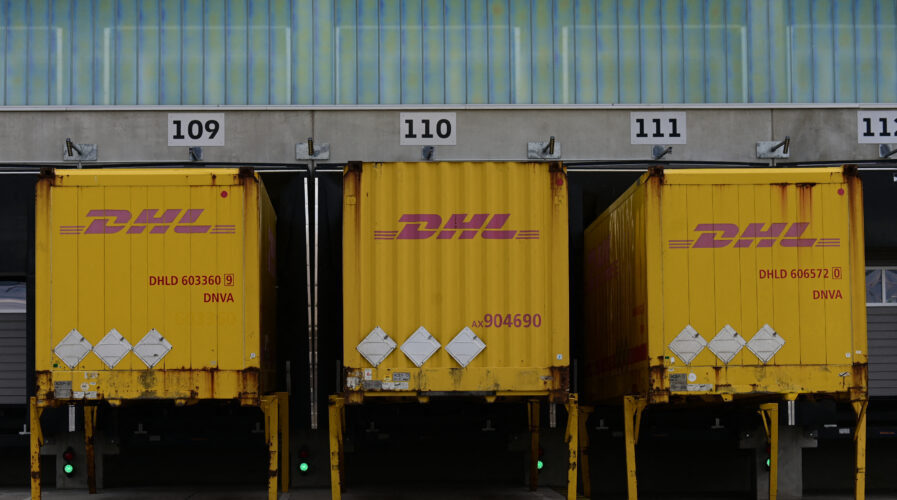
DHL: Recalibrating logistics, supply chains in a post-Covid era.(Photo by Tobias SCHWARZ / AFP)
DHL: Recalibrating logistics, supply chains in a post-Covid era
- Tech Wire Asia spoke with the VP and Europe’s head of innovation at DHL customer solutions & innovations, Klaus Dohrmann, who shared about trends that will help shape the direction of the global logistics industry in the coming years.
While many industries struggled during the Covid-19 pandemic, the logistics industry enjoyed a boom period. In the early days and weeks of the crisis, as the world went into lockdown, country border closures and grounded flights came as demands for PPE and vaccines were at their highest. Further, a sharp rise in e-commerce purchases put extra pressure on global supply chains
The need to keep the world moving accelerated innovations within the logistics industry. Now, as the world focuses on life “post-Covid”, there are ongoing conversations about what the global logistics landscape will look like going forward. McKinsey highlighted that the pandemic has accelerated the rate at which some companies were able to create digital or digitally enhanced offerings by 20 to 25 times.
Processes that used to take years — such as transitioning to remote work and collaboration, implementing technology in operations, and changing ownership of last-mile delivery, to name a few — were accomplished in just days or weeks. Separately, DHL in its Trade Growth Atlas 2022 stated that “International trade in goods has surged to as high as 10% above levels before the Covid-19 pandemic and despite the war in Ukraine, trade is projected to grow faster in 2022 and 2023 than it did over the previous decade.”
Tech Wire Asia had the opportunity to interview DHL customer solutions & innovations’ VP and Europe’s head of innovation, Klaus Dohrmann, who shared which logistics and delivery innovations are arising to meet the global demand that will inevitably not slow down.
What is the status of the logistic industry in the post pandemic era, and how has it been in comparison with the last two years?
I think the view of broader logistics changed a lot in recent years, and Covid-19 has been the main driver for that, because all of a sudden, for many, the importance of logistics became obvious. But I would argue that the pandemic only accelerated this view. Over the last couple of years, you’ve seen companies focusing more on the topics of logistics and supply chain management.
The reason for that is that one can recognize the importance of logistics as a value driver for companies. So if we go back a couple of years, we’ve seen that logistics was more or less about cost and quality. Now we see companies leveraging logistics to achieve the strategic objectives that contribute to their sustainability agenda, to literally deliver the customer experience. When we talk about technologies, the topic of automation and robotics really accelerated during the period.
However, it existed before Covid-19 and companies that were not prepared for it or had not been looking into the topic of automation and robotics, would have had a hard time. We’ve also seen that the leveraging of data became so much more important because visibility has been the main main driver in situations where supply chains are maybe not running as smoothly as they’re supposed to be.
Especially in the area of the Internet of Things, having a system in place where companies can track shipments and also shipment conditions has helped them to grow during the pandemic.

A truck with a containers bearing the logo of German logistics giant DHL is pictured at the loading zone of the new parcel distribution centre operated by Deutsche Post DHL group in Ludwigsfelde near Berlin. The “Mega-Paketzentrum” giant shipment centre, that will be inaugurated on June 1, 2022, has a capacity of 50,000 parcels per hour, according to Deutsche Post DHL. (Photo by Tobias SCHWARZ / AFP)
DHL has mentioned a few times how the supply chain would never return to pre-Covid days. How has the pandemic reshaped the global supply change and what is the new normal?
I think there’s many different views on what constitutes “the new normal”. But I think what we are seeing when it comes to supply chains is that the topic of supply chain resilience has become more important. It always was to a certain degree, but it’s now taking center stage. Because resilience, obviously, prepares companies to deal with uncertainties. Even the topic of supply chain agility took center stage because agility provides you with alternatives to deal with changes, including supply chain challenges as well.
If I may also add, the topic of sustainability of supply chains is also surfacing but that is taking its time and I think that is something that is not necessarily normal. In a situation where everybody is so focused on short term topics like managing challenges, I’m really glad to see that companies, including our company, have an accelerated focus on sustainability. So overall, when it comes to supply chain, the new normal revolves around sustainability, supply chain resilience and agility.

A picture shows a distribution centre at the International logistics DHL Express air hub at the Roissy-Charles de Gaulle airport, outside Paris. (Photo by Eric PIERMONT / AFP)
Are supply chains still very vulnerable? Is the world still too reliant on certain geographical locations or regions?
Companies are now really looking into that and, as I mentioned, supply chain resilience is becoming increasingly important. That also means supply chain diversification is what companies are focusing on. In fact, more companies, not only in the tech sector, plan to increase their suppliers, so they don’t get too dependent on one.
To top it off, companies are looking deeper into their supply chain, no longer only considering tier one suppliers but also tier two and three. Depending on what challenges arise, companies will continue to do that and there will not be an end stage.
What lessons can companies or leaders adapt from the pandemic if they are a supply chain decision maker?
So if you want to look into supply chain resilience, you have to revisit your transportation networks, the suppliers you’re working with and the setup of your warehouses — all of which has to be supported by data. For me, data has two aspects: the collection of data using sensors and IoT devices, then making use of those data points to create insights and forecasting. Obtaining and making intelligent use of data should be an everyday task task going forward.
READ MORE
- 3 Steps to Successfully Automate Copilot for Microsoft 365 Implementation
- Trustworthy AI – the Promise of Enterprise-Friendly Generative Machine Learning with Dell and NVIDIA
- Strategies for Democratizing GenAI
- The criticality of endpoint management in cybersecurity and operations
- Ethical AI: The renewed importance of safeguarding data and customer privacy in Generative AI applications


